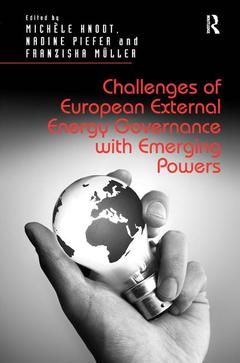Challenges of European External Energy Governance with Emerging Powers
Coordonnateurs : Knodt Michèle, Piefer Nadine

Date de parution : 10-2015
15.6x23.4 cm
Disponible chez l'éditeur (délai d'approvisionnement : 14 jours).
Prix indicatif 164,74 €
Ajouter au panierThème de Challenges of European External Energy Governance with... :
Mots-clés :
Energy Policies; Energy Dialogue; External Energy Governance; Energy Sources; EU Actor; Energy Efficiency; South Africa EU; International Energy Governance; Energy Governance; Dg Trade; Dg Energy; EU Multi-level System; External Energy Relations; EU Energy; Vice Versa; European External Energy Governance; OECD DAC Donor; EU Energy Policy; External Energy Policy; EU External Policy; Energy Resources; EU Energy Market; Bilateral Energy Dialogues; EU's Interest; EU Public



